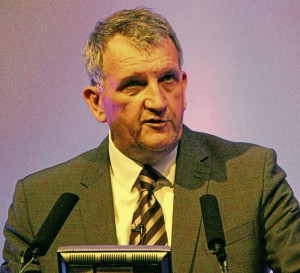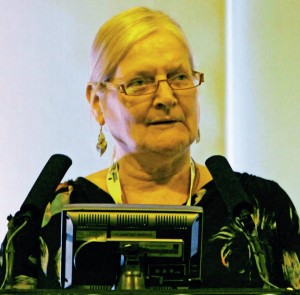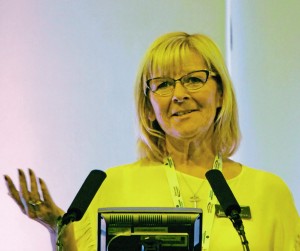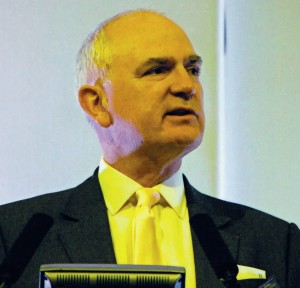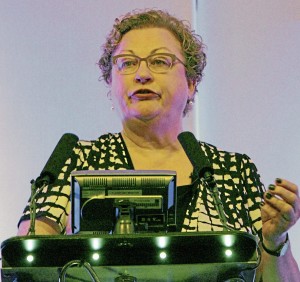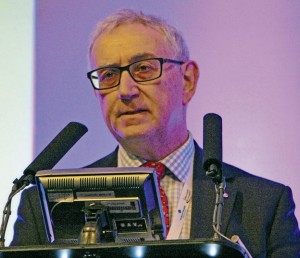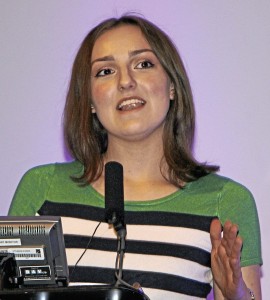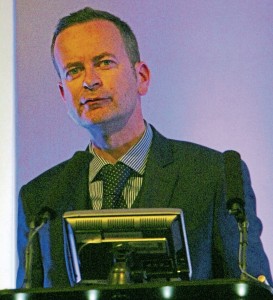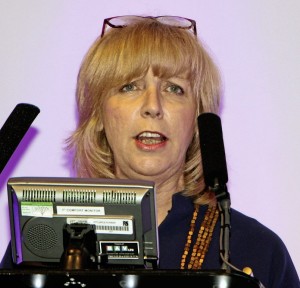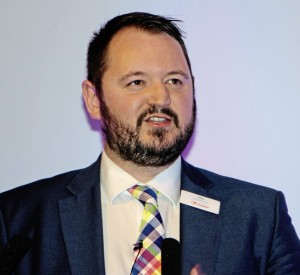ALBUM Conference 2017 – Blackpool
‘Driving the customer experience.’
No sooner had the last coaches departed Blackpool following the UK Coach Rally than the delegates, exhibitors and speakers started arriving in the town for this year’s ALBUM Conference, held at the Hilton Hotel overlooking the sea. The theme chosen was ‘Driving the customer experience’ and this was reflected throughout the speaker’s presentations.
There have been big changes at Blackpool Transport in recent years under the leadership of Managing Director, Jane Cole, as B&CB readers will have read in recent issues. She put forward Blackpool to host this year’s conference and threw herself into it with the team, who she described as ‘absolute stars.’ Delegates were able to see what has achieved so far as your delegate badge entitled you to free travel on the buses and trams for the duration of the conference.
Celebrating ten years in the key role of moderating and introducing the conference was Dave Guest, Chief Reporter with the BBC’s Northwest Tonight programme, who always manages to keep things moving along seamlessly. Attendances were up with a sizeable trade presence and the associated trade displays that are so important an ingredient in the ALBUM mix. Kirsty Flatt’s coverage of the trade displays follows this report.
Cllr Christine Wright
Opening the conference and welcoming guests, Chair of Blackpool Transport Services,
Cllr Christine Wright was restricted in what she could say by the purdah rules preceding the General Election on 8 June. Nevertheless she welcomed delegates, told them Blackpool was ‘on the up’ and encouraged them to enjoy themselves saying, ‘What happens in Blackpool stays in Blackpool.’
Jane Cole
Reiterating Cllr Wright’s welcome, Jane said that with the continuing reduction in Government grants to Blackpool Borough Council, Blackpool Transport was setting about growing its own incomes. It was investing in the tramway extension and the whole of the bus fleet was being renewed between 2015 and 2020 with the result that by 2020 there ‘should never be a bus more than five years old.’
She claimed, ‘The potential for business to boom in Blackpool in the next five years is immense,’ also pointing out that Blackpool Tramway had been the number one attraction in Blackpool on Trip Advisor for the last two years.
Blackpool Sixth Form College
Jane’s presentation was followed by James Carney, Blackpool Transport’s FCD, who introduced a customer research film produced in conjunction with travel and tourism students at Blackpool Sixth Form College. It aimed to share the real travel experiences of 17 and 18 year olds with James saying Blackpool would look at how it could use this knowledge, ‘to progress the revitalisation of our business.’
Most of those interviewed did use buses though two had passed their driving tests and now drove. Their comments were often harsh, with claims of unreliability, crowding, rubbish on the floors, passing stops because they were full, unwelcoming and unsmiling drivers who don’t acknowledge you, and repeatedly, smelly buses. In the film they were taken out on ADL’s latest enhanced City specification Enviro400 MMC demonstrator (which was shown in the demonstration park) and praised it for features such as litter bins, leather trim, legroom, USB points, comfy seats, seat back stop buttons, tables and the glazed rear roof section.
James said that cleaning during the day had been made an action point already, while Jane said that in future, there would be bins on Blackpool’s buses.
Claire Walters
The Chair of Bus Users UK was to have been partnered by Dawn Badminton Capps from Bus Users UK who was unfortunately unable to attend. Claire was critical of her arrival by train in Blackpool saying that there were no signs to indicate where the buses were and all of the directions to the hotel were for people in cars.
Claire said that Bus Users had worked to give all local authorities the right to start municipal bus companies and expressed disappointment that they had not succeeded.
Commenting on the video that preceded her presentation, she said that the organisation got a lot of information from people who were unhappy about their buses adding, ‘There is no excuse for a dirty bus’, suggesting ‘you can have flying squads’ and ‘it’s been proven that you don’t have to have dirty buses.’ Drivers were suspicious of young people, sometimes with good reason, but they needed to be friendly. Input from users was crucial to operators, especially young people, and she offered to help set up a Young Persons Bus Panel in Blackpool.
She reminded people of their obligations under the European Passenger Rights legislation (sections 25-28) which had covered the industry since 2013. Operators needed to have a complaints process in place and to promote the next stage of resolution. Bus Users was now an Alternative Dispute Resolution Service, providing a way of resolving a dispute without going to law. Operators were legally required to give unhappy customers the name of an ADRSDR, though not compelled to engage with the system.
She suggested resolution was cheaper than going to Backhouse Jones, to which Ian Jones retorted, ‘not if you have Back Up at 26p a day – other solicitors are available.’
The top three complaints remained punctuality, reliability and driver attitude, though driver attitude was becoming more important among them.
Adrian Grant
From the TAS Partnership, Adrian looked at ‘The importance of selling to customers and potential customers.’ Illustrating the point that operators always needed to adapt their offering to suit the market and their customers did not care how what they wanted to consume was produced, he used the example of a British company that had manufactured domestic combination hot water tanks, which was very profitable until Margaret Thatcher stopped building council houses and there was a change in the water by-laws that allowed the import of combi-boilers. It meant a reduced market and increased competition which was the equivalent of austerity and Uber in the bus industry. The manufacturer of domestic combination tanks went bankrupt in 2012.
Pondering where you would start if challenged to find additional bus customers, he said it was always easier to sell more to existing customers than to find new ones. He noted that 65.7% of bus passengers were women and that most passengers were in the older and younger age brackets with 30.1% under 16 and 24.1% over 60. 36.9% of journeys were to work, 22.2% were shopping trips and 15.9% were for educational purposes. Of bus users, 45.6% travelled on five or more days a week and 6.5% travelled one day a month or less. 62.7% of passengers had been using buses for two years or more and 77.8% of customers had no car available to them when they caught the bus. From these statistics, he would conclude that operators should talk to women in supermarkets who come from a household with one car or none.
‘How do you actually attract customers?’, he asked, listing 11 points. These were: marketing, new or refreshed buses, increased service frequency, simplified ticketing, fares, cleaning, en route cleaning, driver training, bus information, Wi-Fi and charging, and bus stations and interchanges. Having identified them, he asked which was the most effective, which combination was the most effective, which was the most cost effective and for how long? There was no manual.
The data showed that over 20% of customers had used the bus for less than a year and given that on average customers stay with an operator for five years, where do the 20% that churn annually come from, whose places do they take and where do they go? They went for a variety of reasons including buying cars, moving house, death and becoming old enough to leave home. As far as he knew, nobody had ever looked into why people started using buses? With the mean cost of a weekly ticket across the country being £16, allowing for five weeks holiday you were talking about £752 a year and over five years £3,760, so was it worth going to a supermarket and trying to convert people to using buses?
Ella Beevers
Make a note of the name Ella Beevers because with the confidence and speaking ability this 16 year old has, she should have a glittering career ahead of her. A former member of the Youth Parliament and the founder of the Fairer Fares 4 Youth organisation, she is currently doing her A-levels and plans to study law at university. She is the first Youth Ambassador for Bus Users UK.
Talking about ‘Young People in the Transport Industry’, Ella began by saying, ‘It’s not as bad as you think. Young people know they are in a privileged position, especially at such a difficult time. She thought that being overcritical of transport at this time was unhelpful and to a girl who suggested there could be phone holders on seatbacks she said, ‘get off the phone and interact. Next thing they’ll be wanting back massages on the way to school.’
The thrust of Ella’s message was a call for bus companies to simplify their fares structures and give half fares to young people under the age of 16 providing they were wearing school uniform and without having to buy a pass. She knew there were deals available but young people did not generally know about them. She felt young people were being scammed and indeed forced to subsidise the system for everyone else. She wanted people to take up her cause which would make students more likely to use buses, give better access to education and make it more likely that young people would continue to use buses as young adults.
Her focus was surprisingly narrow in that she was only looking at bus use as a facilitator for education, claiming that one in five truancies was due to a young person not being able to afford the bus fare to school.
Following her presentation Ella was a little surprised to find that a number of operators in the room already had schemes that offered or exceeded what she was looking for, among them Nottingham which offers half fare without a pass to anybody under 19 (as do other operators in the Nottingham area), EYMS who offer half fare travel without a pass up to 16, and Ben Colson who said Norfolk Green had run a pass-less under 19 scheme because it avoided the administration cost of a pass scheme and encouraged young people to travel. He advised Ella to be more radical in what she was asking for, extending it to all under 19 year olds and at all times. Nicola Tidy of Nottingham thought it was ‘a no-brainer.’
Alex Warner
A regular conference speaker and always interesting, Alex Warner combines a day job with Royal Mail with running his own consultancy, Flash Forward Consulting. Alex shared insights on ‘Customer Service – Leadership for Reinvention.’ He also considered some recruitment issues. He looked briefly at businesses that had reinvented themselves to survive as well as once familiar names that had disappeared and questioned whether core elements of the bus industry would still exist in the format we know now in ten years time. ‘Will we still have bus stops and maps or will it all be demand responsive? Tickets, travel shops, timetables and bus stations were other facilities he feared for. ‘Would buses themselves still exist?’ he asked, answering, ‘It’s quite likely that buses will still exist and thrive with us movers and shakers in the room, but it is probable that key concepts will not. Will it even be known as a bus?’ he asked.
‘We have to confront the needs of change and reinvent ourselves,’ said Alex. ‘We are staring down a barrel unless we do something quickly. Change can happen so frighteningly quickly if you don’t listen to the market and reinvent yourself.’ Illustrating change he showed pictures of former England cricket captain, Alistair Cook and wrestler John Cena. 95% of children recognised the latter, only 1% the cricketer just ten years after England won the Ashes.
The changes were being driven by customer needs and it needed inspirational customer service to come to the fore. Alex suggested that it was the managers in independent companies who would need to ensure the bus industry adapted. ‘Look around; There is no-one else out there, no-one else carrying the weight of the bus sector’s responsibilities. No-one else can do it, it is in the independent companies where that weight, expectation, freedom and ability rests most strongly. If you go, we’re screwed.’
‘If you are a younger person looking for a chance to get to the top, you’ve got a great opportunity in this industry because, to some extent, you are backing the underdog and you are going to be succeeding in adversity, hopefully,’ he said, suggesting that comparatively, working in rail was ‘a doddle’. Those in the independent sector had great opportunities and weren’t facing the same pressures and constraints as those in the big groups.
Looking at the problems the industry faces in attracting, retaining and focusing people, Alex considered a number of factors. The bus industry has a stigma with young people. It doesn’t pay very well for jobs where the demands and expectations are high and, with some exceptions (Reading was mentioned) there is a lack of coaching, mentoring and grooming. It is seen by some as a bit of a freak show, there is a lack of role models and some use a spell in it as a stepping stone. Where a vision exists, it is rarely articulated properly or all-consuming, there is a lack of insight and analysis and youngsters today are used to companies having a brand personality; not just on buses but throughout the company, which they don’t often find in bus companies.
After looking at how to deliver a seamless branded experience in the light of 30 different journey ‘touch points’, considering the different approaches of MDs to social media, the different types of customer relations officers, and the many reasons behind the sin of not having a timetable in a rack in a company with the wrong ethos, Alex discussed the second best mentality that exists in some operations. He then suggested 20 different points to address to develop better customer service, among them better root cause analysis, a diversity agenda (but know why you are doing it and how it drives the customer service vision) and greater fixation on demographics and non-users.
To close, he summarised that: the challenge to reinvent ourselves is here and now; a collective effort was needed to produce inspirational entrepreneurial customer leaders who needed to be equipped to rise to the challenge and seize the agenda; these people must inspire but be imbued with an attention to detail, high standards, and the ability to instil the right framework and processes around managing customer service (within the context of an overall customer services vision); ALBUM members needed to be doing this as ‘one’ collectively, as a body, supporting each other; concluding, the time has come, the next two years will make or break the industry.
Beverley Bell
In her last official duty in the North West Traffic Area where she has been a Traffic Commissioner for the past 17 years, as well as holding the position of Senior Traffic Commissioner for the UK since 2012, Beverley was as animated as ever looking back to her original interview when she wore ‘a slightly dodgy green trouser suit’ and when asked what customers expected from bus services she had said, they want buses to be clean and not smell, and the same with their drivers, they wanted them to be safe and they wanted them to run reliably and on time. They still wanted the same now but, ‘technology is moving so fast, how do we in the bus and coach industry keep up to date with that technology, especially when social media affects everything we do?’
Drivers were having to deal with a myriad of technology; dash cams, smart phones, satnavs, 3D printing and CCTV to protect them, passengers and insurance companies. ‘I can’t quite see a stage where we have driverless buses and coaches, but maybe we will,’ she said, asking, ‘how does the industry reinvent itself?’ You could invest millions in new vehicles, but it was no good unless the whole customer experience was good. ‘Customers are a lot more challenging than they ever used to be and have the power of social media behind them,’ she observed.
‘What are the skills you are looking for when employing bus drivers?’ Obviously, it was good if they didn’t drink too much, have drug problems and put their mobile phones away when driving, but it was really about the customer experience.
Another issue we talked about now that we hadn’t always talked about before was mental health. One in four people would suffer from it at some time. Working in transport was stressful. Her challenge to delegates with staff was: ‘What are your occupational road policies and are you doing all you can to support your staff to deliver the best service?’
Turning to enforcement, Beverley asked, ‘Are our regulators as fit for purpose in the 21st century as they were when they were when they were established in 1931? And if they are not robust, who will be?’ She noted that male regulators being robust were seen as heroes while women regulators being robust were ‘bossy cows and control freaks’. She said the DVSA was the only agency capable of properly enforcing. Her challenge to Gareth Llewellyn (Chief Executive of DVSA) was ‘Please enforce’. ‘When points are made to you, don’t ignore them.’
He has said that he wants to work more with Traffic Commissioners to deliver their joint objectives which are to offer a much better service to compliant operators and to be much harder on non compliant ones.
Punctuality has always been Beverley Bell’s big issue and she concluded on time thanking delegates and telling them, ‘I’ve had a ball.’
Asked in the question session that followed whether she would do it again, she said, ‘Absolutely, and I’d enjoy it more.’ Would she have done anything different? ‘I wouldn’t eat so many puddings and I’d engage more with Government,’ she said. On whether there was anything that would go out of the window with Brexit she said she would like to see a relaxation of the rules on financial standing which were currently set against the Euro, and would also like to see a simplification of the driver’s hours regulations.
For the future she was hoping to work with an industry group to promote the benefits of working in the profession, something she would be asking CPT and ALBUM to join in.
Alex Hornby
Transdev Blazefield CEO, Alex Hornby, is ‘Passionately driven by customers’ and took this as the title of his presentation. He told delegates that they were working in an industry with challenges and that we ‘shouldn’t be embarrassed to show our passion and make our product amazing.’ Customer service wasn’t a department, it was a way of life in which drivers were there to look after our customers. He believed his role in the company was to lead the agenda personally. When he had taken the job, Blazefield had lost some of the spirit of entrepreneurship that it was originally known for and Transdev wanted him to get back to that.
He said the company’s mission was, ‘We want to be amazing. We may never get there because times will change.’ Its efforts to achieve amazing will be based on three things. Firstly, a team that is happy to work for the company. Secondly, customers who are proud to use the service and thirdly, creating a successful and innovative business.
For the staff, there was the Transdev Talk magazine in which all of the articles were written by staff members and, following on from staff feedback that said they didn’t like receiving information via notice boards, there was a new Team Transdev app. Everyone was encouraged to say thank you every time anyone did something for them. Eighteen months after he joined the company, it had held its first ‘Amazing’ awards which had been hosted by Dave Spikey, the comedian from television’s Phoenix Nights and was very well received. In line with the customer service ethos, recruiting was for ‘people people’ not bus drivers.
People were allocated to teams for different routes, participating in the launches of those routes and being given uniforms appropriate to them. It was an extra cost but an investment in delivering great customer service. There were 12 different brands now operating and although the motivation had been customer focused and there was the benefit of extra growth, it had been noticed that both accidents and sickness levels among staff on these routes had reduced.
Turning from people to product he said, ‘The bus industry is not finished. It will be finished when people aren’t moving around any more and they are moving about more than ever. But, the issue is that there is an element of what we do that the market doesn’t like in certain places.’ He continued, ‘Citymapper has just launched a bus this week in London, they don’t give a stuff about this, they just care about seeing what the market wants and using data to power it… Its not about quality, it’s about doing it differently. The tech companies are now coming in and they’re doing it differently to us, so our answer is that if the market isn’t happy with us we’ve got to start doing something else.’
Alex explained that new buses costing just under £240,000 each had been launched on the 36 Ripon – Harrogate – Leeds last year. They already had 96% satisfaction on the route but had to do something because they looked into that 96% and found 55% would have switched to the train if they hadn’t carried on improving the product. They thought before doing research that the revamp should be all about new technology but found people liked to exchange books so added a bookshelf and books, though these do need to be regularly topped up. As a result growth has been achieved on a service that had flatlined. The next step will be to look at service levels, which they will do in October.
Now being introduced is Vamooz, a crowd funded service with an App that will be launched this week. The cost to travel will reduce as more people use it.
On CityZap services, it is all about punctuality, so the driver can choose his own route to make the best time. After seven months of operation it is already beating the target for the 12th month. In another initiative, coming soon in Harrogate are eight zero emission buses.
He concluded that ‘businesses are run by people, not spreadsheets.’
Bus Manufacturers panel
After another excellent lunch, delegates returned to the conference suite to hear a panel discussion featuring representatives of some of the event’s major sponsors. Participating were Keith Watson of ADL; Mark Oliver of Scania; Robert Drewery of Optare; Sam Maclaren of Wrightbus and Adrian Felton of Volvo Bus.
There isn’t space to cover what was a lengthy and detailed debate but a key message was that with rail having raised its game and Uber now competing with minibuses as well as taxis, the manufacturers were not reaching Government at the level they needed to. They needed to work together to lobby harder and more effectively on behalf of the bus and promote its benefits. There were messages that needed to be got across, among the most important being that buses are not dirty, their emission levels were significantly lower than those of cars.
The role of manufacturers was changing; it was now much more about engaging with stakeholders and also producing buses that enabled operators to appeal to passengers. There was no single form of fuel or propulsion that would be required, it would be a mix for different applications with diesel continuing to have a role for many years to come, though dedicated electric bus ranges continued to improve dramatically and hydrogen wasn’t very far away.
A lot of new technology was coming and it would increase the possibilities. TfL was already set to start specifying Independent Speed Adjustment (ISA), which would brake the bus without intervention from the driver.
The final speaker was Stephen Fidler of the DfT who briefly outlined the provisions of the Buses Bill.
Last word
The conference was the last for ALBUM Chairman, Ben Colson who has stood down with Nottingham City Transport’s MD, Mark Fowles elected in his place. Many will also be sorry to see Beverley Bell step down from her twin roles. She has had her critics but will be regarded by most as someone who has helped the industry go forward and her unique conference presentation style will be missed.
Networking is a big part of ALBUM and some carried this on into the early hours and beyond which Blackpool was well suited to accommodate. The Conference is now set to go on an international tour with next year’s event being held at the Cameron House hotel on Loch Lomond under the auspices of McGills Buses, with Cardiff the venue for the 2019 event.
